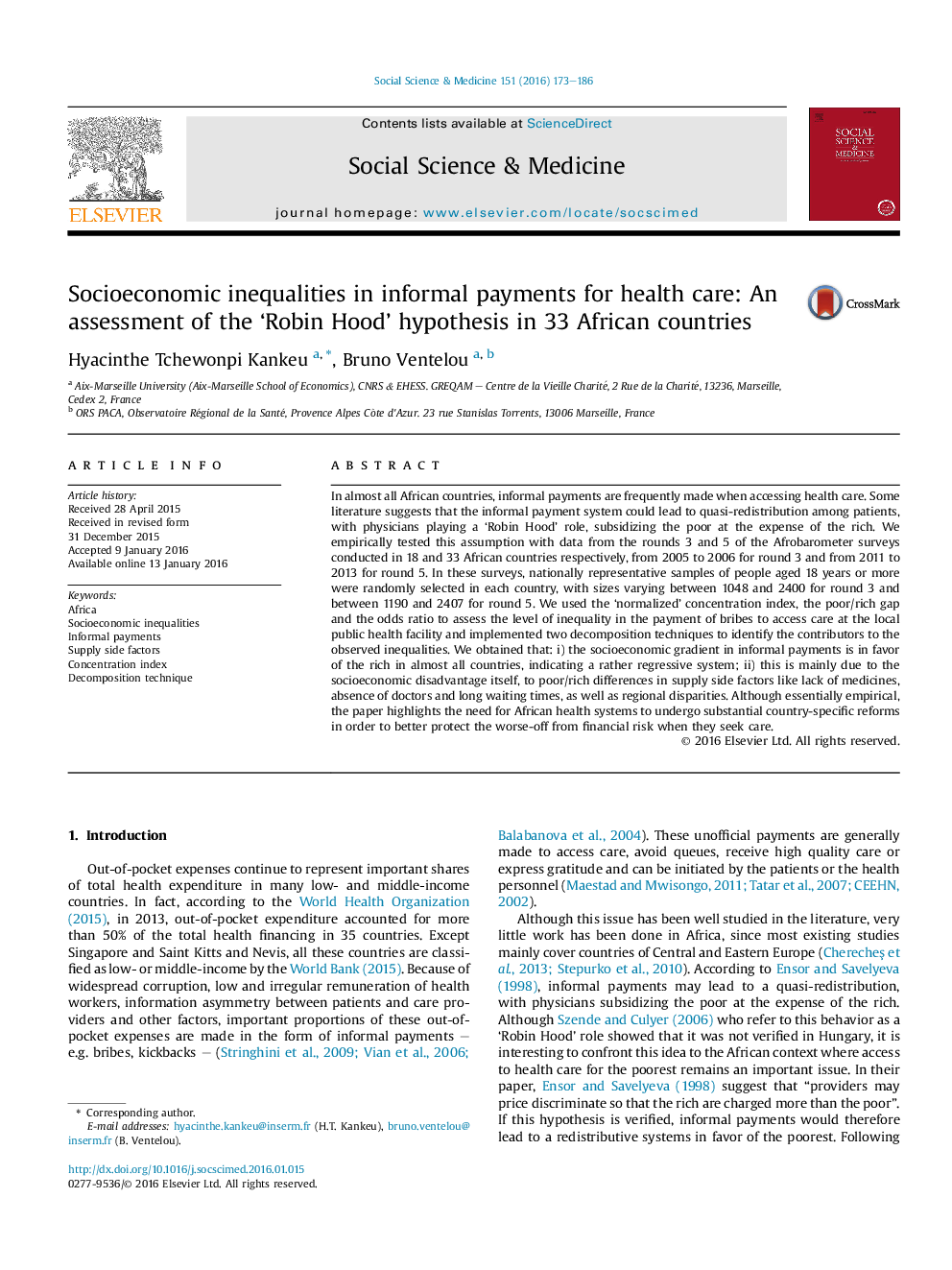| کد مقاله | کد نشریه | سال انتشار | مقاله انگلیسی | نسخه تمام متن |
|---|---|---|---|---|
| 7330748 | 1476018 | 2016 | 14 صفحه PDF | دانلود رایگان |
عنوان انگلیسی مقاله ISI
Socioeconomic inequalities in informal payments for health care: An assessment of the 'Robin Hood' hypothesis in 33 African countries
ترجمه فارسی عنوان
نابرابری های اجتماعی-اجتماعی در پرداخت های غیر رسمی برای مراقبت های بهداشتی: ارزیابی فرضیه رابین هود در 33 کشور آفریقایی
دانلود مقاله + سفارش ترجمه
دانلود مقاله ISI انگلیسی
رایگان برای ایرانیان
کلمات کلیدی
آفریقا، نابرابری اجتماعی پرداخت غیر رسمی، عوامل جانبی عرضه، شاخص غلظت روش تجزیه
ترجمه چکیده
در تقریبا تمام کشورهای آفریقایی، پرداخت های غیر رسمی هنگام دسترسی به مراقبت های بهداشتی اغلب انجام می شود. برخی از ادبیات نشان می دهد که سیستم پرداخت غیر رسمی می تواند منجر به تقسیم توزیع مجدد میان بیماران، با پزشکانی که نقش "رابین هود" را بازی می کنند، به نفع فقرا بهای غنی باشد. ما تجربی این فرضیه را با داده های دورهای 3 و 5 بررسی های افروفوارومتر انجام دادیم که در 18 و 33 کشور آفریقایی به ترتیب، از 2005 تا 2006 به مدت 3 دور و از 2011 تا 2013 برای دور 5 مورد آزمایش قرار گرفت. در این بررسی ها، نمونه های ملی نماینده افرادی که در سن 18 سالگی یا بیشتر بودند، به طور تصادفی در هر کشوری انتخاب شدند، با اندازه های مختلف بین 1048 تا 2400 برای دور 3 و بین 1190 و 2407 برای دور 5. ما از شاخص غلظت "نرمال شده"، شکاف فقیر / غنی و نسبت شانس برای ارزیابی سطح نابرابری در پرداخت رشوه برای دسترسی به مراقبت در مرکز بهداشت عمومی محلی و اجرای دو روش تجزیه برای شناسایی مشارکت کنندگان در نابرابری های مشاهده شده. ما به این نتیجه رسیدیم که: 1) شیب اجتماعی-اقتصادی در پرداخت های غیر رسمی به نفع ثروتمندان تقریبا در همه کشورها است، که نشان دهنده یک سیستم نسبتا تلخ است؛ دوم این است که این موضوع عمدتا ناشی از کمبودهای اقتصادی اجتماعی است که به اختلافات فقیر و غنی در عوامل عرضه، مانند فقدان دارو، عدم وجود پزشکان و زمان انتظار طولانی، و نیز اختلافات منطقه ای. گرچه اساسا تجربی است، این مقاله نیاز به سیستم های بهداشتی آفریقا را برای تحقق اصلاحات خاص کشور مشخص می کند تا بهتر از بدتر شدن خطر مالی در هنگام مراقبت از آنها محافظت شود.
موضوعات مرتبط
علوم پزشکی و سلامت
پزشکی و دندانپزشکی
سیاست های بهداشت و سلامت عمومی
چکیده انگلیسی
In almost all African countries, informal payments are frequently made when accessing health care. Some literature suggests that the informal payment system could lead to quasi-redistribution among patients, with physicians playing a 'Robin Hood' role, subsidizing the poor at the expense of the rich. We empirically tested this assumption with data from the rounds 3 and 5 of the Afrobarometer surveys conducted in 18 and 33 African countries respectively, from 2005 to 2006 for round 3 and from 2011 to 2013 for round 5. In these surveys, nationally representative samples of people aged 18 years or more were randomly selected in each country, with sizes varying between 1048 and 2400 for round 3 and between 1190 and 2407 for round 5. We used the 'normalized' concentration index, the poor/rich gap and the odds ratio to assess the level of inequality in the payment of bribes to access care at the local public health facility and implemented two decomposition techniques to identify the contributors to the observed inequalities. We obtained that: i) the socioeconomic gradient in informal payments is in favor of the rich in almost all countries, indicating a rather regressive system; ii) this is mainly due to the socioeconomic disadvantage itself, to poor/rich differences in supply side factors like lack of medicines, absence of doctors and long waiting times, as well as regional disparities. Although essentially empirical, the paper highlights the need for African health systems to undergo substantial country-specific reforms in order to better protect the worse-off from financial risk when they seek care.
ناشر
Database: Elsevier - ScienceDirect (ساینس دایرکت)
Journal: Social Science & Medicine - Volume 151, February 2016, Pages 173-186
Journal: Social Science & Medicine - Volume 151, February 2016, Pages 173-186
نویسندگان
Hyacinthe Tchewonpi Kankeu, Bruno Ventelou,
